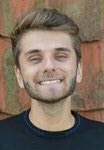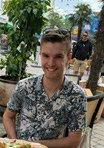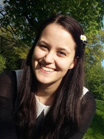Current PhD projects in Computational Linguistics

The impact of aging, cognition, and sensory function on speech
(2023-2028)
This project explores the impact of aging on cognitive and sensory function, and how they interact with speech production. Speech motor control processes will be examined across age and in the two most prevalent neurodegenerative disorders that occur with older age: Alzheimer’s and Parkinson’s Disease. This project is funded by the NWO grant PhD in the Humanities is carried out by PhD student Katharina Polsterer under the supervision of Defne Abur and Martijn Wieling.

InDeep: Interpreting Deep Learning Models for Text and Sound
(2021 -2025)
Recent advances in the field of neural machine translation (NMT) led to the integration of deep learning-based systems as essential components of most professional translation workflows. As a consequence, human translators are increasingly working as post-editors for machine-translated content. My project aims to empower NMT users by improving their ability to interact with NMT models and interpret their behaviors. In this context, new tools and methodologies will be developed and adapted from other domains to improve prediction attribution, error analysis and controllable generation for NMT systems. These components will later be included in an interactive CAT tool conceived to improve post-editing efficiency, and their effectiveness will be validated by means of a field study with professional translators. I will work with the supervision of Arianna Bisazza and Malvina Nissim as part of the NWO-funded network "InDeep: Interpreting Deep Learning Models for Text and Sound".

Speech flexibility in adulthood following oral cancer treatment: Acoustic and kinematic explorations
(2021 - 2025)
Whenever we speak, we make use of both feedforward (stored motor programmes for specific sounds) and feedback mechanisms (where auditory and tactile feedback are used to correct our pronunciation). While there is lots of experimental evidence suggesting that people are very flexible in adapting to perturbations on the short-term (i.e. a bite block or lip tube), little is known about the long-term flexibility of our speech motor system. The central aim of my PhD project is to investigate this long-term flexibility by following individuals who have been surgically treated for oral cancer. As treatment induces chronic anatomical changes, motor equivalence strategies have to be formed. We will capture these strategies using electromagnetic articulography and the acoustic speech signal. We also measure the individual’s reliance on both feedback mechanisms to investigate whether one mechanism better predicts the success of these strategies. This project is supervised by prof. dr. Martijn Wieling and dr. Max Witjes (UMCG)
Changing speech patterns of dialects in the north of the Netherlands
(2020-2024)
Dialects in the Netherlands are known to become more similar to Standard Dutch over time. We investigate the changing speech patterns of dialects in the north of the Netherlands on an aggregate level. By combining existing large phonetically transcribed datasets (extended with newly collected data using a mobile laboratory) with advanced statistical models, we are able to investigate these speech patterns across many decades. The data used for this project are constructed in such a way that we will be able to directly relate apparent-time and real-time approaches, which will shed light on the long-standing dilemmas between these methodologies. In line with recent studies, we also account for sociolinguistic variation in order to ensure accurate and reliable results of the dialectometric analyses.
Approaches for developing and using language models in lower-resource languages
(2020-2024)
In recent years, large neural language models are being developed and are used for practical natural language processing applications. General language models with the Transformer architecture require large amounts of data in a target language as well as large amounts of computing power. As a result, research has is mostly focussed on the English whereas multilingual and non-English monolingual models are mainly reproductions of best performing solutions in English. In my PhD project, I will explore approaches for developing and using language models in lower-resource languages with a focus on Dutch and Gronings respectively as medium-high and very low-resource languages. In addition to using shared information between languages I will try to capture stylistic and regional differences within languages to for instance create models that are inclusive for minority dialects.
Speech planning and monitoring in Parkinson's disease: a speech motor control perspective
(2019-2023)
Despite doing it almost without effort, speaking is a highly complex task requiring precisely timed and linguistically-driven coordination of the lungs, vocal folds and speech articulators (e.g. lips, tongue). This process, speech motor control, relies on both feedforward (pre-planned movements based on stored movement representations drawn from past experiences) and feedback (monitoring sensory input relative to what is expected) control mechanisms. Research suggests that these mechanisms may be impaired in Parkinson’s disease (PD) patients. However, current findings have resulted from studies with small samples and heterogeneous PD groups.
The central aim of this project is to identify which speech control mechanisms in PD patients are impaired and to what extent by comparing newly-diagnosed PD patients, advanced-stage PD patients, and healthy adults. Specifically, we will investigate how participants cope with feedback perturbations in speech, by measuring both the resulting acoustic speech signal and the underlying speech motor articulation using electromagnetic articulography and ultrasound tongue imaging. To assess whether the potential impairments of the feedback and feedforward system are speech-specific or more general (as PD is a movement disorder), we will also conduct feedback perturbation experiments in non-speech motor movement tasks.
The innovative combination of these methods will enable us to identify whether and how impairments of speech planning and monitoring are related to the progression of PD. Furthermore, the extent to which PD patients cope with feedback perturbations compared to healthy adults may potentially serve as a diagnostic marker for the disease. This would be highly relevant in our aging society.
The PhD project is supervised by prof. dr. Martijn Wieling and dr. Roel Jonkers in collaboration with dr. Aude Noiray from the Laboratory for Oral Language Acquisition (University of Potsdam). The research is funded by the NWO grant PhD in the Humanities and carried out within the Centre for Language and Cognition Groningen in affiliation with the Research School of Behavioural and Cognitive Neurosciences (BCN).

Interpretability of Multilingual Neural Network Models
(2019-2023)
Multilingual neural network models are models that are trained on multiple languages, either simultaneously or incrementally. Rather than training models on individual languages, such models lead to reduction in training times as well as the number of parameters to be trained. Certain multilingual neural network models such as Googles Multilingual NMT system have outperformed models only trained on a single language, suggesting that multilingual models learn to share useful knowledge crosslingually through their learned representations. However, understanding and interpreting the source of this success remains a challenge.
Leading questions of the PhD research will be, for instance: What specific language phenomena are learnt, or not, by multilingual neural network models? To what extent do they capture language structure? Are they plausible models of human language acquisition?
Another important part of the project will be dedicated to the development of multilingual neural models of language and translation that are able to learn and exploit language structure effectively.
This project is partially funded by a personal grant for excellent researchers awarded to Dr. Bisazza by the Netherlands Organisation for Scientific Research (NWO VENI).

Framing Situations in the Dutch Language
(2019-2023)
My PhD project will help develop a FrameNet for Dutch and Italian, as part of the NWO-funded project Framing Situations in the Dutch Language, a collaboration between RUG and VU in Amsterdam. My main contribution will be to develop an automatic frame labeler: software that can read a text and add annotations about the situations described in the text.
Automatic rating and recognition of Groningen speakers
(2019-2023)
In this project we aim to investigate (using a data-driven approach) how pronunciation variation in the province of Groningen and the Low Saxon language area is distributed geographically and how it has changed over time. In addition, we will investigate if it is possible to automatically rate how similar someone's pronunciation is to a specific regional target pronunciation. Finally, we aim to identify how many people speak a dialect and if this affects cognition. This project is funded by both the Center for Groningen Language and Culture, the Faculty of Arts of the University of Groningen and the Centre for Digital Humanities of the University of Groningen.




